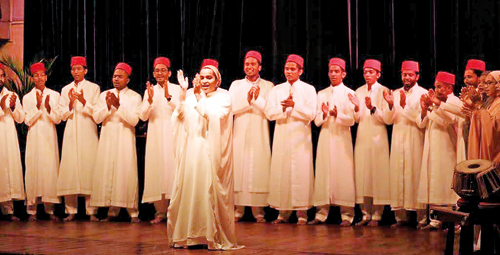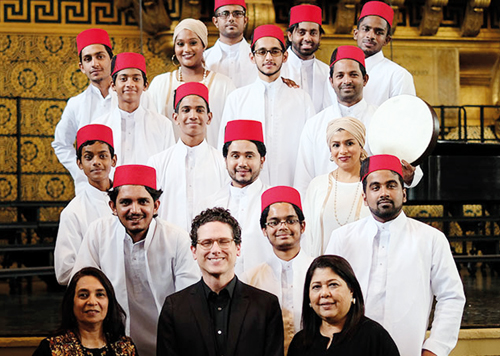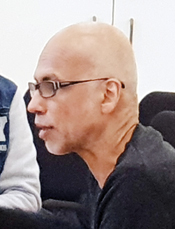Music in the spirit of peace
Driven by the simple desire to help Sri Lankan youth, Haadia Galely has created a powerful force for peace

Early days: The Muslim Choral Ensemble performing at the Russian Cultural Centre in Colombo
In June 2018, an ensemble of young Sri Lankan choristers opened their souls in song onstage at the Yale International Choral Festival. Their soulful renditions of Islamic devotional music, from naats to hamds, baiths and Sufi-style qawwalis, touched hearts in the audience. After the performance, there were hugs and tears. Some said, “I do not know what you sang, but you moved me.”
It was a miracle of sorts because just over a year before, the same youths had auditioned with voices so raw, the ensemble’s co-founder and Executive Director Haadia Galely left the room in dismay. She was auditioning choristers for her new initiative, the Muslim Choral Ensemble (MCE) and had invited the group of young Sufi musicians to her home. Then she watched with trepidation through the door, the reaction of MCE co-founder Prof. Andre de Quadros, Boston University professor of music and music education, ethnomusicologist, writer, and human rights activist, who had flown to Sri Lanka to help with the auditions.
The professor was polite. You did well, boys, he told them. After they left, he wanted to know what Haadia intended to do. Earlier in the day, a call for auditions had yielded just two applicants.
“I want to give them a chance, so we will give them an opportunity to train,” she replied.
Haadia turned to Manoj Sanjeewa, lecturer, music director, composer, and singer at the Visual and Fine Arts University, for vocal coaching. He had trained many a choir, but not one that sang in Persian, Arabic or Urdu, common languages of Islamic devotional music that he was unfamiliar with.
Further, training youth with little or no formal music education posed challenges varying from understanding the technique of music education, to thinking and performing in unison, creating respect for Islamic musical traditions, and assimilating these elements with spirituality in presentation. Manoj took it in his stride and in the process got to know and understand the nuances of the tradition and its core message of love and peace.
Professor de Quadros, a heavyweight in global choral circles, was an important presence, providing direction and inspiration.
So began the Muslim Choral Ensemble, born of the simple objective to provide Muslim youth in Sri Lanka with an avenue to pursue their cultural musical talents. Haadia, who had been in music promotions for three decades, says Sri Lanka has a wealth of youthful music talent but they lack opportunities, funding, and direction.

Touching hearts: MCE at the Yale International Choral Festival 2018 with the Festival’s Artistic Director Jeffrey Douma (centre front) and Haadia Galely ( front right)
“Muslim youth are in the choral groups of public and international schools. They are in the qasida (general Islamic devotional music) groups and other choral groups, but it stops after they leave school because we don’t have Muslim choral groups to absorb them, and some parents are reluctant to let their children go into singing. So, I thought, why not give them a platform for devotional songs,” she says.
MCE was launched in August 2017, with performances at the Russian Cultural Centre and the Sooriya Village. The invitation to perform at the Yale International Choral Festival, alongside choirs from Mexico, Germany, and New York, came the following year.
Their programme at Yale included a momentous item: a joint rendition of Tala al badru alaina, considered the oldest piece in Islamic hymnology, sung in welcome for the Prophet Mohammed some 1400 years ago by the people of Medina. Performed by MCE and the Yale Alumni Choir, it created history as, possibly, the first time a chorus of Americans had united with a Muslim ensemble to sing an Islamic hymn in America. That the Muslim choir originated from Sri Lanka is also phenomenal.
“This is truly a magnificent moment,” Prof de Quadros told the audience. “With so much division, bigotry and hate in our society, we should celebrate this moment of love and of divinity.”
It also highlighted the power of devotional song to draw together emotions and consciousness not only inwardly individually but collectively towards unity and healing. In Sri Lanka, the genre often promotes an intermingling of faiths, for instance, people of all faiths join in Hindu bajans or attend Christian choral performances.
MCE has embraced this powerful unifying agenda. The Easter bombings prompted Haadia in collaboration with Shangri-La Hotel to birth a new initiative, Voices for Peace, an interfaith concert featuring not only MCE, but also local artistes Umara, Dmitri, Soundarie David Rodrigo and Soul Sounds, performers from the University of Visual and Performing Arts, and more. Foreign artists such as Shahid Shabaz, winner of The Voice UAE, also joined. Voices for Peace reappeared in February this year at the Shangri-La featuring Buddhist, Christian, Hindu choral ensembles and MCE, directed by Manoj Sanjeewa, Soundarie David Rodrigo, and Francis D’Almeida, with Professor de Quadros as the guest conductor.

Prof. Andre de Quadros
MCE have welcomed Christian and Buddhist choristers into their fold. In 2019, four non-Muslim members of MCE participated in the Shanghai Cooperation Organisation Countries’ Youth Choir, in Inner Mongolia. The same year also saw MCE participate in the International London Music Festival and perform also with the University of the Philippines Singing Ambassadors in a church where the two groups interwove their Christian and Muslim music heritages in a spellbinding performance.
Aside from music, MCE provides a character-building opportunity for young people, says Haadia. Young choristers learn discipline, and social and life skills through the diversity of experiences to which they are exposed, and parents often share with her how these experiences have helped build up confidence in their children.
Importantly, MCE has also created a platform for all Muslim sects to unite and showcase an Islamic spiritual repertoire, exploring the rich tradition of Muslim devotional music in Sri Lanka.
In a conversation with Decible.lk, the professor touched on the richness of Islamic music. There is a diversity of different genres in what might be regarded as the music of the Muslim world…, he said. Apart from the spiritual recitation of the Quran that is not considered to be music, there are a lot of other things: secular songs, hymns that go back 1500 years, Sufi songs, community songs that praise Allah, in the language of the community, be it Persian, Arabic, Indonesian, Urdu or Sinhalese. MCE would like to stand for the entire spectrum of Islamic music, including popular songs.
MCE can also helped mitigate misconceptions and misunderstandings that have led to the marginalization of Muslims locally and globally. This ethos echoes the professor’s words in a 2011 interview online: “Music cannot bring peace to the Middle East (and music can not solve the problems of Sri Lanka…). However, bringing people together to work together, sing together, play together, make poetry together, experience interaction on the human level allows us to appreciate who the other person might be.”
Haadia’s next step is the creation of the World Muslim Choral Ensemble (WMCE), which will gather choristers and instrumentalists from across the world to participate in a celebration of Islamic music. Funding permitting, WMCE will take off from Sri Lanka this year and move across the world. Already a number of countries have expressed interest.
Looking for funding in this bleak landscape is a challenge, but Haadia believes in her cause. This endeavour is not for profit but for peace, she says. “We are in the performing arts, but beyond the performing arts. All our performers are ambassadors of peace.
“After having gone through so many years of war, I am tired of the words like ‘justice’ and ‘conflict’. There is so much that we are fighting for… I just want to focus on the end result: peace.”
See also: http://muslimchoralensemble.com/
World Muslim Choral Ensemble
Searching for an ideal partner? Find your soul mate on Hitad.lk, Sri Lanka's favourite marriage proposals page. With Hitad.lk matrimonial advertisements you have access to thousands of ads from potential suitors who are looking for someone just like you.


